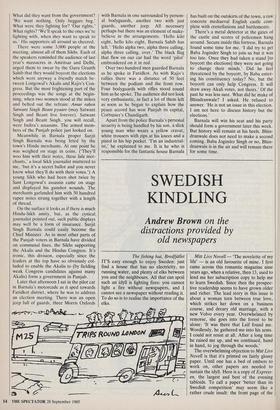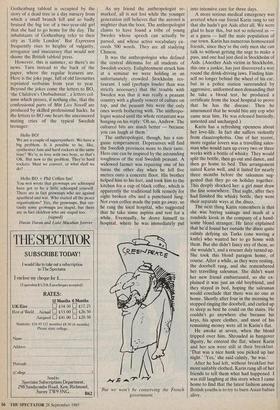SWEDISH KINDLING
Andrew Brown on the
distractions provided by old newspapers
The fishing hut, Bredfjallet IT'S easy enough to enjoy Sweden: just find a house that has no electricity, no running water, and plenty of elks between you and the neighbours. All that can spoil such an idyll is lighting fires: you cannot light a fire without newspapers, and I cannot see a newspaper without reading it. To do so is to realise the importance of the elks. Mitt Livs Novell — 'The novelette of my life' — is an old favourite of mine. I first came across this romantic magazine nine years ago, when a relative, then 13, used to lend me her subscription copy to help me to learn Swedish. Since then the prospec- tive readership seems to have grown older and richer. The lead story in this issue is about a woman torn between true love, which strikes her down on a business course, and dreary old marriage, with a new Volvo every year. Overwhelmed by remorse, she goes into the forest to be alone: 'It was there that Leif found me. Wordlessly, he gathered me into his arms. I could not resist at all. After a long time he raised me up, and we continued, hand in hand, to jog through the woods.'
The overwhelming objection to Mitt Livs Novell is that it's printed on fairly glossy paper. Until one has a bed of embers to work on, other papers are needed to sustain the idyll. Here is a copy of Express- en, the largest and best of the evening tabloids. To call a paper 'better than its Swedish competition' may seem like a rather crude insult: the front page of the Gothenburg tabloid is occupied by the story of a dead tree in a day nursery from which a small branch fell and so badly bruised the big toe of a two-year-old girl that she had to go home for the day. The inhabitants of Gothenburg refer to their city as 'Little London'. But Expressen frequently rises to heights of vulgarity, arrogance and inaccuracy that would not shame the British tabloid press.
However, this is summer, so there's no news. Turn instead to the back of the paper, where the regular features are. Here is the joke page, full of old favourites reprinted verbatim from year to year. Beyond the jokes come the letters to BO, `the Children's Ombudsman', a letters col- umn which proves, if nothing else, that the confessional parts of Mitt Livs Novell are produced by skilled professional hacks. In the letters to BO one hears the uncensored mating cries of the typical Swedish teenager:
Hello BO!
We are a couple of supersynthers. We have a big problem. Is it possible to be, like, synthesiser fans and hard rockers at the same time? We're in love with two boys, so that's OK. But now to the problem. They're hard rockers. Must we convert, or what shall we do? . . .
Hello BO + Phil Collins fan!
You wot wrote that grownups are schtoopid have got to be a little schtoopid yourself. There are in fact grownups who are against apartheid and war. Who started all the peace organisations? Yes, the grownups. But cer- tainly some grownups are stupid, but there are in fact children who are stupid too.
(signed) Duran Duran and Luke Macahan forever
As my friend the anthropologist re- marked, all is not lost while the younger generation still believes that the aerosol is mightier than the boot. The anthropologist claims to have found a tribe of young Swedes whose speech can actually be parsed, and whose active vocabulary ex- ceeds 500 words. They are all studying Chinese.
It was the anthropologist who defined the central dilemma for all students of Swedish society. Enlightenment struck him at a seminar we were holding in an unfortunately crowded Stockholm res- taurant. I said (perhaps louder than was strictly necessary) that the trouble with Sweden was that it was really a peasant country with a ghastly veneer of culture on top, and the peasant bits were the only ones worth bothering with. The anthropo- logist waited until the whole restaurant was hanging on his reply: 'Oh no, Andrew. The cultured bits are much better — because you can laugh at them.'
The anthropologist, though, has a san- guine temperament. Depressives will find the Swedish provinces more to their taste. Here one can be inspired by the astounding toughness of the real Swedish peasant. A widowed farmer was repairing one of his barns the other day when he fell five metres onto a concrete floor. His brother helped him to his feet, and took him to the kitchen for a cup of black coffee, which is apparently the traditional folk remedy for eight broken ribs and a punctured lung. Not even coffee made the pain go away, so he rang the local hospital, who suggested that he take some aspirin and rest for a while. Eventually, he drove himself to hospital, where he was immediately put 'But we won't be conserving the French government.' into intensive care for three days.
A more serious medical emergency was averted when our friend Karin rang to say that she hadn't got Aids after all. We were glad to hear this, but not so relieved as at a guess — half the male population of our town. Karin has numerous homosexual friends, since they're the only men she can talk to without getting the urge to make a pass, and one had just died in Stockholm of Aids. (Another Aids victim in Stockholm, this one a junkie, has just discovered a way round the drink-driving laws. Finding him- self no longer behind the wheel of his car, but in a police station surrounded by aggressive, uniformed men demanding that he take a blood test, he produced a certificate from the local hospital to prove that he has the disease. Then he announced that he would bite any cop who came near him. He was released hurriedly, untested and uncharged.) Karin has a refreshing openness about her love-life. In fact she suffers violently from claustrophobia. One of her recent, more regular lovers was a travelling sales- man who would turn up every two or three weeks with a bottle of whisky. They would split the bottle, then go out and dance, and then go home to bed. This arrangement suited Karin well, and it lasted for nearly three months before the salesman sug- gested that they go on holiday together. This deeply shocked her: a girl must draw the line somewhere. That night, after they had finished the whisky bottle, they went their separate ways at the disco.
The next thing Karin remembers is that she was buying sausage and mash at a roadside kiosk in the company of a hand- some blond stranger. He later explained that he'd found her outside the disco quite calmly defying six Turks (one waving a knife) who wanted her to go home with them. But she didn't fancy any of them, so she wouldn't, and a rescuer duly turned up. She took this blond paragon home, of course. After a while, as they were resting, the doorbell rang, and she remembered her travelling salesman. She didn't want her new friend embarrassed, so she ex- plained it was just an old boyfriend, and they stayed in bed, hoping the salesman would conclude that there was no one at home. Shortly after four in the morning he stopped ringing the doorbell, and curled up to sleep as best he could on the stairs. He couldn't go anywhere else because his keys, his spare clothes, and most of his remaining money were all in Karin's flat.
He awoke at seven, when the blond tripped over him. Shrouded in hungover dignity, he entered the flat, where Karin and her son were still at their breakfast. `That was a nice hunk you picked up last night." Yes,' she said calmly, 'he was.'
After he had left, without breakfast but more suitably clothed, Karin rang all of her friends to tell them what had happened. I was still laughing at this story when I came home to find that the latest fashion among British youths is to try to burn Asian babies alive.















































 Previous page
Previous page